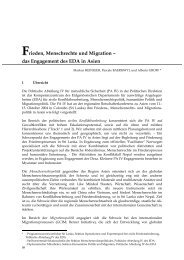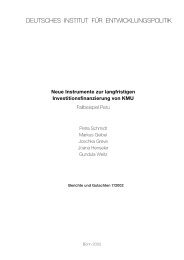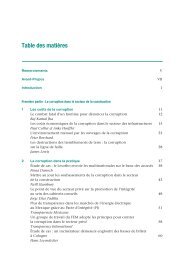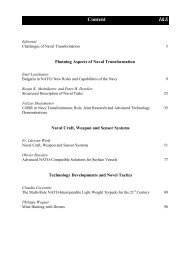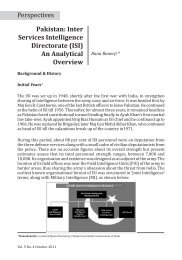Andreas Stamm Eva Dantas Doris Fischer Sunayana ... - ETH Zürich
Andreas Stamm Eva Dantas Doris Fischer Sunayana ... - ETH Zürich
Andreas Stamm Eva Dantas Doris Fischer Sunayana ... - ETH Zürich
Create successful ePaper yourself
Turn your PDF publications into a flip-book with our unique Google optimized e-Paper software.
Sustainability-oriented innovation systems<br />
The approach derives the need for policy intervention from the concept of system failure.<br />
In order to identify system failures and to derive feasible policy options, the authors look<br />
at the chain of innovation processes from R&D, through the demonstration, precommercial<br />
and supported commercial stages to the fully commercial stage. The two stages<br />
most likely to suffer from system failures are the transition between the demonstration<br />
stage and the pre-commercialisation stage and between the pre-commercialisation stage<br />
and the supported commercialisation stage. The authors derive sets of policies adequate to<br />
push forward sustainability innovations, namely promotion of basic R&D, market-creating<br />
policies and fiscal incentives. These should be seen as complementary, and not substitution-oriented,<br />
environmental policies in the stricter sense.<br />
For developing countries with restricted public budgets, market-creating policies appear to<br />
be of special significance, as they do not necessarily call for increased government spending<br />
or lower revenues. Public procurement is an opportunity to increase the diversity of<br />
technologies available and give cleaner technologies the opportunity to mature through<br />
learning-by-doing and learning-by-interacting (strategic niche management). Other options<br />
discussed to create markets for environmental technologies include: awarding prizes<br />
for high-performance sustainable solutions and setting long-term, outcome-based targets<br />
or obligations for cleaner technologies to gain a certain share of the market.<br />
Towards a research agenda<br />
Having identified the gaps in the available literature, we can now conclude that the issue<br />
of how best to build effective sustainability-oriented innovation systems (SoIS) in<br />
anchor countries is still a rather unexplored research field. We propose that further<br />
research be clustered around three main and interlinked topics:<br />
1. What are the specificities of sustainability-oriented IS?<br />
2. Are sustainability-oriented innovation systems emerging specifically in the anchor<br />
countries?<br />
3. Are we observing a shift towards global innovation systems for sustainability?<br />
1. Specificities of SoIS<br />
There is at present no comprehensive approach to explain what makes sustainabilityoriented<br />
innovation systems (SoIS) different from commercial IS, and thus what feasible<br />
policy options there may be to shape SoIS. Some specific features of SoIS may, however,<br />
be derived from the fact that the main concern is to generate innovations that reduce pressures<br />
on the environment, and thus on (global) public goods. This implies that SoIS suffer<br />
from a two-fold market failure:<br />
− a private company will usually not reap all of the benefits from investment in innovation<br />
activities (non-appropriability);<br />
− environmental costs continue to be largely externalised.<br />
Where markets fail in such a systematic manner, the role and responsibility of policy making<br />
are especially important. This gives rise to the question: How can policy contribute specifically<br />
to the formation and strengthening of sustainability-oriented innovation systems?<br />
German Development Institute / Deutsches Institut für Entwicklungspolitik (DIE) 3






